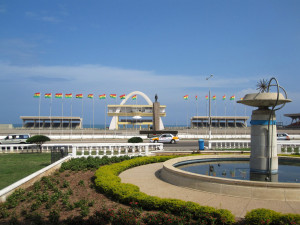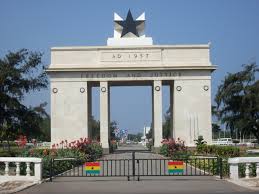How can we improve Ghana Government Services?

Since returning back to Ghana after more than eight years away, I have heard many recollections from family, friends and strangers about their exhausting experiences visiting government institutions and agencies for various services. Whether it is following a government-given mandate to move from handwritten passports by a given date, renewing an almost-out-of-date driver license or obtaining a work permit for some people seeking to work honestly.
Ideally government institutions will have structures in place to encourage improved performance. However in many emerging nations where government resources are stretched or inadequate, such systems are not instituted even when they exist. In such a situation, what role can ordinary citizens and non-government institutions play? I have thought about things I can do as an individual to make these experiences better and on many occasions, nothing tangible has occurred. Many of these government agencies struggle to respond to their customers, tax-paying citizens and residents. From what I can see, there are two main factors on which this issue persists:
- Government agencies have no incentive to improve the standards of the services they are offering
- Users of government services have no collective and reliable information to highlight the poor quality of service provided by such institutions
Proposal

What if there was a way to incentivize these institutions openly to improve the quality of services they offer? What if users of these services, journalists and government had a reliable resource that easily and consistently showed the performance of agencies we rely on for keys services? Can we build a data-driven tool or service that consolidates these deficiencies together to encourage and demand change? I believe we can!
Creating a crowd-sourced Government Agency Rating system could be one avenue to tackling this. Such a system will produce a rating based on selected factors that reflect the quality of services of these institutions. Factors could include quality of website, ease of payment, presence of online service and duration of service. Ideally, data about these factors will be sourced from a large pool of individuals who use these services for various reasons. Eventually, this data could be collated into an interactive visualization open for public use.
Challenges
The goal of this project will be to provide access to data about government services to stakeholders. They will then have a reference point to discuss the performance of any service and demand improvements where needed. This means that the system must:
- Identify the main stakeholders and how they will use such a system on a regular basis
- Create a structure to efficiently collect data
- Demonstrate the credibility of the rating system
- Encourage the use of the system through open access and visualization
- Train stakeholders on how to effectively use such a system for maximum impact
Ghana as an emerging nation is still learning ways to utilize open data to drive civic and social policies and decisions. Aside creating the relevant infrastructure on which data literacy and engagement can thrive, we must create a culture where individuals and organizations are invested in utilizing and providing data. I believe starting with a simple data-driven approach that targets a major pain point for many Ghanaians creates an opportunity to understand the Open Data landscape while also showing stakeholders the power of demanding and driving a more Open Data culture. I believe the Government Agency Rating system could be a start in fostering this.


